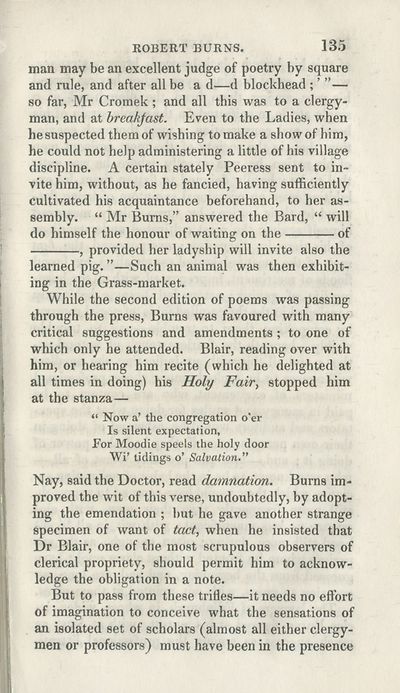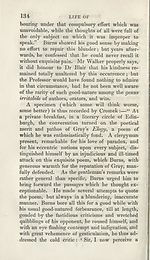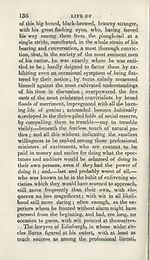Scotland/Scots > Life of Robert Burns
(145)
Download files
Complete book:
Individual page:
Thumbnail gallery: Grid view | List view

ROBERT BURNS. 135
man may be an excellent judge of poetry by square
and rule, and after all be a d—d blockhead ; ’ ”—
so far, Mr Cromek ; and all this was to a clergy¬
man, and at breakfast. Even to the Ladies, when
he suspected them of wishing to make a show of him,
he could not help administering a little of his village
discipline. A certain stately Peeress sent to in¬
vite him, without, as he fancied, having sufficiently
cultivated his acquaintance beforehand, to her as¬
sembly. “ Mr Burns,” answered the Bard, “ will
do himself the honour of waiting on the of
, provided her ladyship will invite also the
learned pig.”—Such an animal was then exhibit¬
ing in the Grass-market.
While the second edition of poems was passing
through the press, Burns was favoured with many
critical suggestions and amendments ; to one of
which only he attended. Blair, reading over with
him, or hearing him recite (which he delighted at
all times in doing) his Holy Fair, stopped him
at the stanza—
“ Now a’ the congregation o'er
Is silent expectation,
For Moodie speels the holy door
Wi’ tidings o’ Salvation.”
Nay, said the Doctor, read damnation. Burns im¬
proved the wit of this verse, undoubtedly, by adopt¬
ing the emendation ; but he gave another strange
specimen of want of tact, when he insisted that
Dr Blair, one of the most scrupulous observers of
clerical propriety, should permit him to acknow¬
ledge the obligation in a note.
But to pass from these trifles—it needs no effort
of imagination to conceive what the sensations of
an isolated set of scholars (almost all either clergy¬
men or professors) must have been in the presence
man may be an excellent judge of poetry by square
and rule, and after all be a d—d blockhead ; ’ ”—
so far, Mr Cromek ; and all this was to a clergy¬
man, and at breakfast. Even to the Ladies, when
he suspected them of wishing to make a show of him,
he could not help administering a little of his village
discipline. A certain stately Peeress sent to in¬
vite him, without, as he fancied, having sufficiently
cultivated his acquaintance beforehand, to her as¬
sembly. “ Mr Burns,” answered the Bard, “ will
do himself the honour of waiting on the of
, provided her ladyship will invite also the
learned pig.”—Such an animal was then exhibit¬
ing in the Grass-market.
While the second edition of poems was passing
through the press, Burns was favoured with many
critical suggestions and amendments ; to one of
which only he attended. Blair, reading over with
him, or hearing him recite (which he delighted at
all times in doing) his Holy Fair, stopped him
at the stanza—
“ Now a’ the congregation o'er
Is silent expectation,
For Moodie speels the holy door
Wi’ tidings o’ Salvation.”
Nay, said the Doctor, read damnation. Burns im¬
proved the wit of this verse, undoubtedly, by adopt¬
ing the emendation ; but he gave another strange
specimen of want of tact, when he insisted that
Dr Blair, one of the most scrupulous observers of
clerical propriety, should permit him to acknow¬
ledge the obligation in a note.
But to pass from these trifles—it needs no effort
of imagination to conceive what the sensations of
an isolated set of scholars (almost all either clergy¬
men or professors) must have been in the presence
Set display mode to:
![]() Universal Viewer |
Universal Viewer | ![]() Mirador |
Large image | Transcription
Mirador |
Large image | Transcription
| Antiquarian books of Scotland > Scotland/Scots > Life of Robert Burns > (145) |
|---|
| Permanent URL | https://digital.nls.uk/108247599 |
|---|
| Description | Thousands of printed books from the Antiquarian Books of Scotland collection which dates from 1641 to the 1980s. The collection consists of 14,800 books which were published in Scotland or have a Scottish connection, e.g. through the author, printer or owner. Subjects covered include sport, education, diseases, adventure, occupations, Jacobites, politics and religion. Among the 29 languages represented are English, Gaelic, Italian, French, Russian and Swedish. |
|---|

